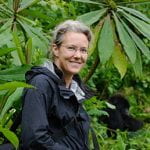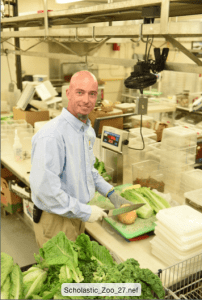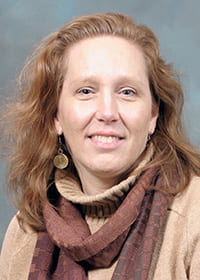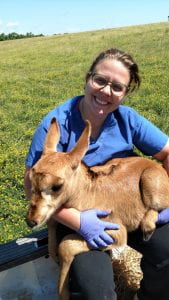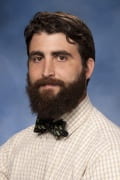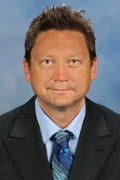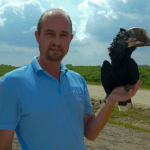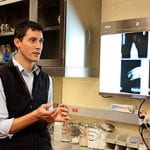Lucy Spelman, DVM, DACZM earned her veterinary degree from the University of California at Davis and subsequently completed a one-year internship in small animal medicine at Ettinger and Associated in Los, Angeles, California, and a three-year residency in Zoological Medicine at North Carolina State University in Raleigh in North Carolina. In 1994, she received her board certification from the American College of Zoological Medicine. She worked for the Smithsonian Institution’s National Zoo for 9.5 years, as a media consultant for Discovery Communications, and served as the Field Manager for the Mountain Gorilla Veterinary Project from 2006-2009. She returned to the United states to teach at Brown University and then moved on to the Rhode Island School of Design in September 2010. In 2015, she launched Creature Conserve, an online gallery of works by student artists and designers researching and responding to the problems facing animals today. In addition to various scientific articles, she is the author of the “National Geographic Animal Encyclopedia,” and co-editor of a book of short stories, “The Rhino with Glue-on Shoes.”
Mike Maslanka is the senior nutritionist and head of the department of nutrition science for the Smithsonian’s National Zoo and Conservation Biology Institute. He is responsible for oversight, guidance, and participation in commissary operations, clinical nutrition, nutrition lab operations, field- and zoo-based nutrition, research, and outreach. He received his Bachelors of Science in forestry and wildlife science from Virginia Polytechnic Institute and State University, his Masters of Science in nutritional physiology from the University of Minnesota, and then completed the zoo nutrition residency at the Brookfield Zoo in Chicago. He is a professional fellow in the Association of Zoos and Aquariums (AZA), serve as the chair of the AZA Nutrition Advisory Group, a members of the Comparative Nutrition Society, and serves as the nutrition advisor for numerous Species Survival Plans (SSP) and Taxon Advisory Group (TAG) programs across a wide variety of taxa.
Karen Terio, DVM, PhD, serves as the chief of the Zoological Pathology Program through the. University of Illinois and is a clinical professor at the University of Illinois’ College of Veterinary Medicine. She received her DVM from Tufts University and her PhD from the University of California-Davis and is a diplomate of the American College of Veterinary Pathologists. Her research focuses predominantly on diseases of wild felids and primates, involving both disease surveillance and research. She works with a number of international conservation organizations including the Gombe Ecohealth Project and the Cheetah Conservation Fund as well as the Great Ape Heart Project and the Association of Zoos and Aquariums Felid Taxon Advisory Group and Species Survival Plans.
Katie Seeley, DVM, DACZM, graduated with her veterinary degree from Cornell University in 2011. After graduation she worked as a veterinary intern at the National Aquarium in Baltimore, Maryland and at the Point Defiance Zoo & Aquarium in Tacoma, Washington. She completed her residency in Ecosystem Health and Conservation Medicine through The Ohio State University in 2017 and was employed by the National Aquarium before returning to Ohio where she currently serves as a staff veterinarian at The Columbus Zoo and Aquarium.
Eric Hostnik, DVM, MS, DACVR is an assistant professor at The Ohio State University with a special interest in zoo and wildlife species. He completed his veterinary education at the University of Florida, and followed additional training as an emergency clinical with companion animals and pocket pets at VCA South Shore Animal Hospital. Dr. Hostnik completed his diagnostic imaging residency and Master’s programs at The Ohio State University. His research interests focus on the use of CT, including the role of CT in zoo settings. When not working, Dr. Hostnik enjoys the music and spots of Columbus, Ohio, as well as snowboarding and camping when home in Vermont.
Risa Pesapane received her Bachelors in Biology and her Masters in Fisheries and Wildlife Sciences through Virginia Polytechnic Institute and State University. In 2019, she completed her PhD in Ecology from the University of California-Davis focused on Vector-Borne Disease. She currently serves as an Assistant Professor at the OSU School of Environment and Natural Resources and in the Department of Veterinary Preventive Medicine at The Ohio State University College of Veterinary Medicine.
Dr. Mark Flint is the head of the Zoo and Wildlife Conservation Medicine and Ecosystem Health Program in the College of Veterinary Medicine at The Ohio State University. He received his veterinary degree, Masters degree, and PhD from The University of Queensland. Dr. Flint is also the director of Vet-MARTI and is an Adjunct Senior Fellow in the School of Veterinary Science at The University of Queensland and also serves on the Animal Welfare Advisory Board for the Morris Animal Foundation. His research areas focus on identifying prevalent and emerging diseases in marine and freshwater animal species as they relate to environmental and commercial stressors. The overarching theme to his investigations is to identify anthropogenic and natural pressures that will impact the survivorship of species and health of the ecosystem,. He takes a multi-species approach to this investigation concentrating on fauna that offer potential as a sentinel of ecohealth for their environmental niche. He is widely published on these topics in continuing education, journals, and book chapters.
Dr. Amanda Steinagel, DVM, is a small mammal resident at MedVet Hilliard. She received a Bachelor of Science degree in Biology from Randolph-Macon College in Ashland, VA, followed by a Doctor of Veterinary Medicine degree from The Ohio State University College of Veterinary Medicine. After completing veterinary school, Dr. Steinagel performed a yearlong small animal medicine and surgery internship with the Pennsylvania Veterinary Specialty and Emergency Associates at Hickory Veterinary Hospital in Plymouth Meeting, Pennsylvania, as well as a second internship in avian and exotic medicine and surgery at the Animal Medical Center in New York. In addition to her clinical endeavors, Dr. Steinagel is an active member of several professional organizations, as well as a published author with publications covering a wide variety of topics, including vitamin C supplementation in giant elephant shrews, mussel hematology and biochemistry, and endoscopy in psittacines.
Wouter Stellaard has been in the animal field for 28 years. His passion and career began in the Netherlands while working in a wildlife rehabilitation centre. He created his own animal ambulance while finishing his animal care studies. In the search for further education he came to the US where he graduated from the Exotic Animal Training and Management Program at Moorpark College. After an internship he was hired at Natural Encounters Inc. As a senior trainer he helped create, set up, train, and present bird shows at zoos and aquariums across the country. As the Director of Behavioral Programs he consulted both nationally and internationally to create zoo wide animal training programs with keepers to grow their training and presentation skills. Currently Wouter is the Animal Programs Training Director at the Columbus Zoo and Aquarium.
Dr. Mike Selig is a 2003 graduate of The Ohio State College of Veterinary Medicine. He initially worked in a private practice that saw a heavy exotics case load, did a large amount of wildlife rehabilitation, and was responsible for the veterinary care of the Akron Zoo. In 2010, he became a staff veterinarian for the Cleveland Zoo and was promoted in 2018 to be the Head of Veterinary Programs. He enjoys working with the hundreds of species at the zoo and the unique challenges they present. However, turtles have always been his favorite taxonomic group. He currently is involved with local turtle conservation via SPOTD (Save and Protect Ohio Turtle Diversity) as well as international turtle conservation through his support of the Asian Turtle Program located in Vietnam.
